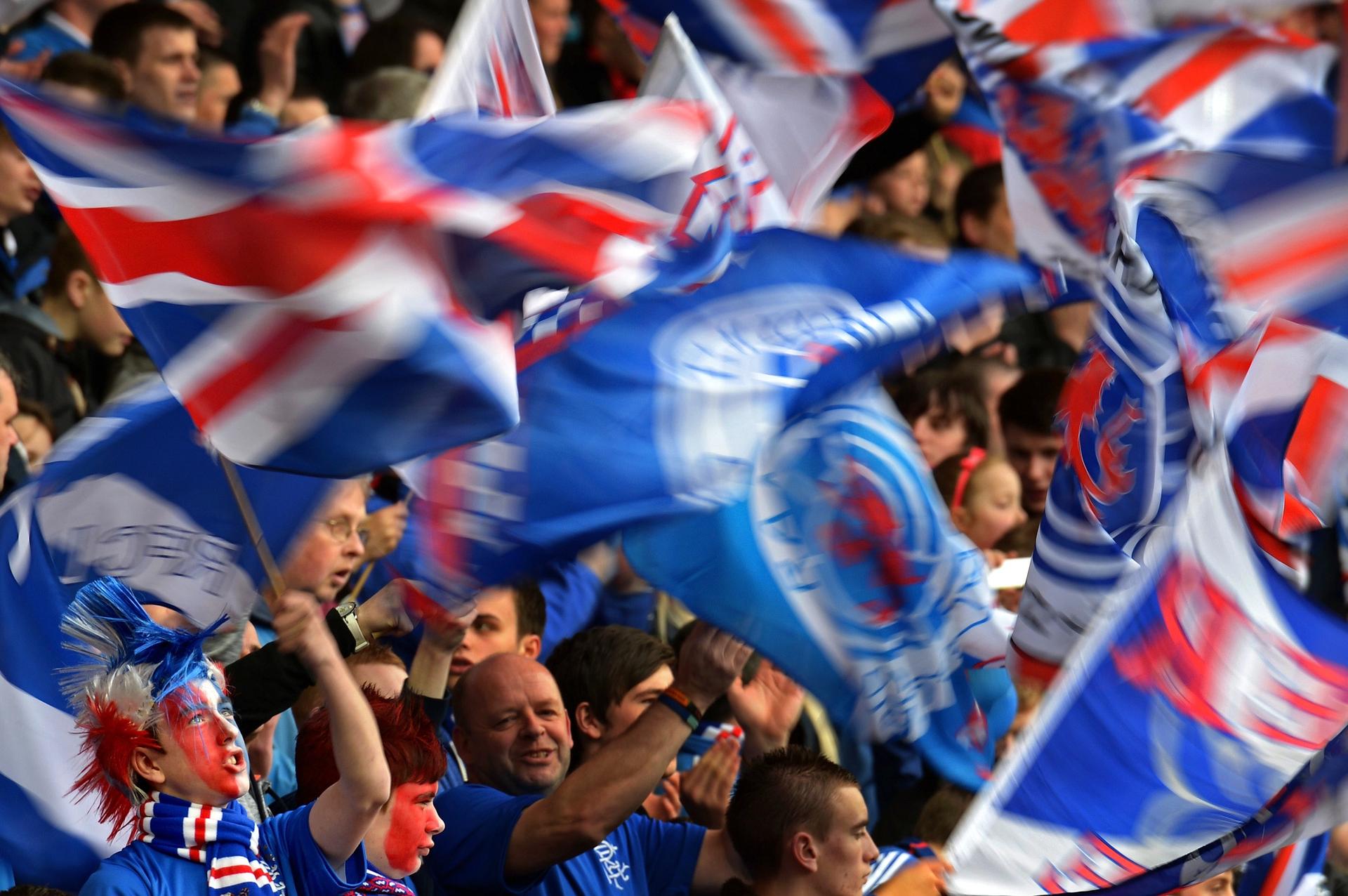Scotland’s sectarian shame
Rangers fans wave the Union Jack. A hard core of supporters are helping perpetuate sectarianism.
GLASGOW, Scotland — This city sometimes appears to be defined by soccer. The country’s largest metropolis is home to the two most successful teams, Rangers FC and Celtic FC, and the rivalry between what’s called the Old Firm is one of the world’s fiercest.
When the two sides met in the Scottish Cup two years ago, the game ended with three dismissals and both club managers scuffling on the sidelines in front of almost 60,000 fans.
There’s something else particular about Scottish soccer.
Fans around the world often describe the sport as a “religion,” but Rangers and Celtic have very real ecclesiastical connections, and they’re helping fuel a sectarianism that’s been a persistent if not very visible part of life here.
Rangers have traditionally been identified with Protestantism, while Celtic, which was founded a priest in 1887, is often seen as a symbol of the Irish Catholic community that migrated to Scotland starting in the mid-19th century. Consequently, the Old Firm has often taken on religious and political dimensions.
The rivalry is temporarily off for now after Rangers were demoted to a lower tier in the soccer league last year following the club’s bankruptcy. However, last month, members of the British military allegedly joined in sectarian singing and chanting at Rangers’ Ibrox stadium during a match against another team.
Later, in an apparently unrelated incident, a photograph of a man holding a carving knife to the throat of an image of Celtic manager Neil Lennon circulated on social media.
“Sport and politics and religion have been bound up together in Scotland,” says David Scott, campaign director of anti-sectarian charity Nil by Mouth.
“In the past, we were told that football was a safety valve for sectarianism,” he adds. “But rather than that, it has sustained the beast.”
Nil by Mouth was established in 1999 after the sectarian murder of 16-year-old Mark Scott in an unprovoked attack in Glasgow. Scott’s killer was the son of a member of the Ulster Volunteer Force, a loyalist paramilitary group in Northern Ireland.
Scotland is an “echo” of the political situation Northern Ireland, Scott says. National flags are common at both Celtic Park and Ibrox. The Tricolor, a symbol of Irish nationalism, is often flown in the terraces at Celtic. The British Union Jack is popular among Rangers supporters.
Michael Rosie, a lecturer in sociology at Edinburgh University, says both teams are guilty of “dog whistling,” using symbols and phrases that appeal directly to a hard core of supporters.
“The problem is who the Old Firm are dog whistling at — it’s people who take a very ethnic-national view of their identity or who see their football team as representing an ethnic-national cause, whether that’s the Union or republicanism in Northern Ireland.”
Nevertheless, sectarianism is much less visible than in Northern Ireland.
Anti-Catholic discrimination in workplaces is a thing of the past. The vast majority of the more than 7,000 arrests for sectarian offences in Scotland during the last decade were for non-violent incidents. Although police have made sectarian arrests in every Scottish region, most were concentrated in the greater Glasgow area.
“Raw sectarianism will increasingly be confined to the downscale quarters of the population, where conflict is manufactured out of crude religious symbols,” says Tom Gallagher, emeritus professor at Bradford university and the author of Divided Scotland: Ethnic Friction and Christian Crisis.
Still, the issue leapt onto the political agenda in 2011 after a series of parcel bombs were sent to leading Catholics, including Celtic manager Neil Lennon.
Last year, the Scottish national party-led government in Edinburgh enacted a law that criminalizes sectarian chanting at soccer grounds — although many inside and outside the sport see it as both heavy-handed and an unworkable restriction on civil liberties.
Sectarianism has also has entered the rhetoric over the drive for Scottish independence.
The Orange Order, a Protestant fraternal organization historically allied to Rangers, is calling for a “No” vote, while some republican groups close to sections of the Celtic support favor independence.
“These groups are trying to position themselves within the broader independence debate,” Rosie says, adding that they’ve been largely unsuccessful. He says the cross-party campaign for a “No” vote, called Better Together, sees groups like the Orange Order as “toxic.”
More from GlobalPost: Broken hearts, on exhibit
Earlier this year, MP George Galloway warned that Catholics — who make up around a sixth of the population — could face discrimination if Scotland votes to split from the United Kingdom entirely in a referendum set for next September.
But Gallagher disagrees. “The idea that you could have some kind of mini-version of Northern Ireland presumes that religion is a big deal for the political elite, and that’s not the case,” he says. “The political elite in Scotland is overwhelmingly secular.”
Polls suggest Catholics are just as, if not more, likely to support independence than those from other or no denominations.
“Sectarianism isn’t the biggest problem Scotland faces,” says Scott of Nil By Mouth. “But we shouldn’t underestimate the hold it has on people who inhabit that world.”
We want to hear your feedback so we can keep improving our website, theworld.org. Please fill out this quick survey and let us know your thoughts (your answers will be anonymous). Thanks for your time!
